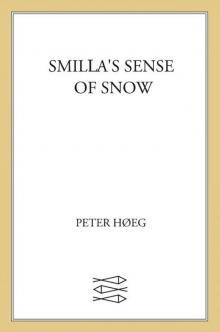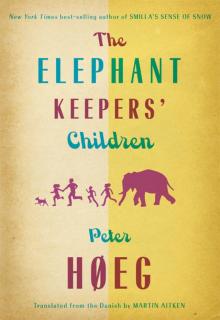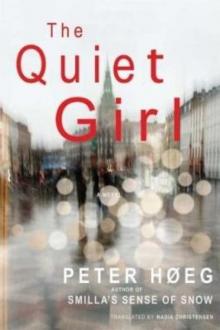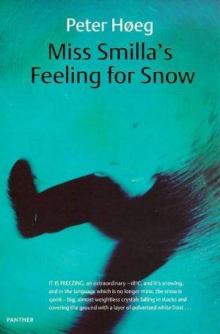- Home
- Peter Høeg
The Woman and the Ape Page 14
The Woman and the Ape Read online
Page 14
Even by London standards this was an impressive display of force. Prompted—as only a very few, including Andrea Burden, knew—by the fact that an action was being mounted against an unequivocal enemy.
Having once exceeded a certain critical size, every organism develops a number of self-destructive traits, and in London’s gigantic mycelium of police, military and intelligence units, departmental rivalry, hole-in-the-corner intrigue and bureaucratic jealousy had long since borne fruit in the form of well-advanced, tumorous growths. And what a tumor craves, of course, is neither an internal purge nor its own liquidation. What it wants is a good external foe. Erasmus the ape was not just good, he was wonderful, seemingly heaven-sent—like the Falklands War, only on a smaller scale, a dragon, an economy-size King Kong tailor-made for taking the public’s mind off such insoluble problems as the general deterioration and impoverishment of the city, race riots and widespread organized crime. Besides which it was completely apolitical. And to top it all it had kidnapped a princess. Hyde Park had been floodlit to create an arena into which St. George of the System might ride.
* * *
An hour after nightfall the ape rose, wrapped an arm around Madelene, parted the screen of leaves at a shadowed spot and leapt, almost horizontally, into what seemed to Madelene to be a pitch-black void.
Their glide lasted long enough for her to note the hissing drag of the cool night air, the warmth of the ape’s body, its stillness in the air after takeoff and its gradual preparation for landing. It lighted upon a branch eight yards farther on with the muffled weight of a tawny owl swooping down into the undergrowth, and then it began to run.
Heading away from the wall of the Danish Society toward the center of the park, it had propelled itself forward by means of its long arms, in great pendulous swings. Now it had forsaken this sweeping movement, forging ahead instead by means of both feet and its one free hand, and where the trees were too far apart it jumped.
Not once did it get caught in the light. They made the park wall as if through a tunnel of shadow. A few yards above one of the lookout posts the ape paused. The moment it was waiting for came half a minute later: those few seconds of inattention among the men beneath them which resulted not from negligence or loafing or any other reason unique to these men, but because it is in the nature of human consciousness to switch on and off, on and off. In that second when it was disconnected, while the men were swapping places and exchanging a brief word or two, the ape jumped.
Its jump carried them into a light so bright that they might have been leaping from the wings onto a stage and Madelene shut her eyes. She waited for the shot, or the cry that would give them away, but it never arrived. The only sound came from the traffic beneath them and the wind whistling in the trees along which the ape was traveling. Madelene opened her eyes. She saw that the creature was running. Straight ahead—parallel with the street but high above it—it ran, along cables, across scaffolding and buttresses. Its physical and sensory faculties could pick out a path invisible to human eyes, cutting across the city at third-floor level.
Madelene saw the vehicles below them, she saw people on the pavement, people in cars—saw them quite clearly. She saw the backs of the men patrolling the park. She saw the fire engines with their extension ladders and their crews waiting for the dawn and—directly beneath her, on a low roof—she saw two of the police snipers, saw their faces, their eyes, their night glasses. But they did not see her and they did not see the ape, even though she and it were fully visible, bathed in the light.
The ape was climbing higher now, up drainpipes, over balconies and fire escapes, then up another story to a heart-stoppingly haphazard network of flagpoles, cornices and balustrades. Then farther up still, to the lowest unbroken run of rooftops in London.
They passed by windows beyond which families huddled around the television. They ran across verandas on which people were taking in washing. They came past men and women in elevators and stairwells, people on balconies who looked straight at and past them.
No one noticed them. This progress of theirs was not just a journey through space; it also constituted a passage through the civilized consciousness, and for the first time ever Madelene had the feeling that this watchfulness was not something omnipresent but that it was, in fact, concentrated. She saw how people on the street only took in what was happening at street level. She saw how those who were searching for her had forgotten themselves and everything else in the outside world other than the spot where they believed their quarry to be. She saw how people sitting in front of a television became oblivious to everything except the tiny patch of flickering unreality before their eyes; how, when engaged in any sort of activity, people paid no heed to anything other than the job at hand.
Carrying Madelene, the ape ran straight across a glass roof beneath which children played; they passed a dinner party on a roof terrace just an arm’s length away; they raced around and past a young couple who looked straight through them and up at the stars and no one noticed them. And having come within spitting distance of them, Madelene understood why. It was because these people did not expect to see them. Faced by the mass of stimuli and information generated by London, its inhabitants had closed their minds, quite categorically, to the possibility of anything truly miraculous.
Until this moment, Madelene had always pictured the British capital as the city liked to think of itself, as a nerve center of sleepless, hyperactive vitality. Now she discerned a truer picture. Looking into these faces, devoid of all suspicion, she saw that the city had its head in the clouds; that—despite its seven million people, its telephones, its never-ending supply of energy, its feverish activity, its streams of nutrients and effluent—its mind was quite simply elsewhere; that it hung suspended in a permanent and only spasmodically interrupted absence.
Through this gigantic urban daydream the ape moved like a circus performer high above a stunned audience. Whereas a human being, pulling up short, would be caught off balance just for an instant, it could stiffen—even when running, even halfway through a turn—and hold itself still as a statue. If a figure suddenly appeared in a doorway, if a face behind a window was turned in their direction, the ape would freeze into inertness, and always, in such situations, some escape route would present itself—a ledge behind which to duck, or a power cable to drop onto—as though the animal itself were creating the world through which it moved. Eyes blank with concentration, it executed a sequence of movements for which the city provided a backdrop, while at the same time it was capable, quite suddenly, of becoming one with a gray wall, a ventilation shaft or a chimney pot.
But no illusion is ever perfect, and the ape’s were no exception. There were times when a section of drainpipe came away from the wall in its hand and plummeted clattering into the abyss. Times when a sudden, unexpected breeze wafted its burnt-rubber odor across a dinner table; when a woman in a kitchen suddenly pulled back a curtain and peered out at their vulnerable joint silhouette—exposed, backlit, swinging from three washing lines suspended eighty feet above a backyard.
But no one took any notice of them, no one sensed their presence, no one saw them or smelled them or heard them. Until that moment Madelene had never known any form of unconsciousness other than sleep. Now she realized that even when they are awake people may be asleep. Oblivious to space, they slept, their sense of smell slept, their hearing, their vision and their sense of touch. And their imagination slept—their ability to conjure up images, which might have kept a channel open to the unknown—that too slept.
In that hour a hush fell over the city. It closed its eyes, its lights went out, its streets emptied, it abandoned the last semblance of vigilance. Its televisions shut down, its traffic came to a standstill. Even around Hyde Park, far behind Erasmus and Madelene, the men on watch withdrew into themselves. During that hour there was something moving about London, as if it had cast aside all pretension and revealed its true nature: it was not, after all, some superior life form sinc
e no living organism ever grinds to such a complete halt. Nor was it a forest or urban jungle, since no jungle sinks into such a torpor at night. What it in fact now proved to be was a machine. A sorry machine—worn out, dilapidated, to some extent faulty, full of blind spots and flat points, and crisscrossed by the forgotten tracks along which the woman and the ape were now traveling.
two
On a flat roof high above the city the ape set Madelene down then dropped over the rim like a falcon diving. It seemed to pitch headlong from ledge to ledge, disappearing from view to return seconds later carrying a crate full of bananas and oranges. It put the crate down and began to eat as quickly and methodically as a migrating bird breaking its journey to rest, knowing as it does so that the longest stretch still lies ahead.
It dawned on Madelene that the ape still did not know her name. She placed her hand on her chest.
“Madelene,” she said.
“Madelene,” repeated the ape.
Its voice was dark, darker than any human being’s, but its pronunciation was distinct, accentless, perfect.
The feeling of all rules being waived went to Madelene’s head like an injection of alcohol and she took a step backward. Even before this action was effected the ape had anticipated it, risen and stretched out an arm, but Madelene was not about to fall. She was on the point of lifting off. Only an hour earlier she had been awaiting her execution and before that she had been a suicidal alcoholic caught in a breakneck downward spiral. Now she had ascended out of this pit, it had taken her less than an hour to rise up and she was still climbing.
“I don’t know when you … that is, animals … I mean apes, grow up,” she said. “But I’ve often wondered when humans do. And now I know.”
In all the time she had known the ape, she had heard it say a total of two words, but it never occurred to her that it would not be able to understand her. What she now had to say was, she felt, of universal importance, comprehensible to all living creatures.
“I’ve often thought: Now I’m no longer a child. I thought it when I married Adam. And at our high school graduation parties. And with my first boyfriends. But I see now that this was wrong.”
“Wrong,” repeated the ape, its mouth full of banana.
“Grown up,” she said, “is something you become only once you are free.”
“Free,” the ape said, and peeled an orange.
The eyes above the steadily working jaws rested on her, and Madelene experienced the uplift that comes from talking and being listened to, felt it like a warm, soaring thermal airstream, and she spread her wings and took to the air.
“Something else has happened too,” she said. “I think I know who I am now. I’m a sort of princess.”
This was a sudden promotion, one that took even Madelene by surprise, and for one brief moment she threatened to metamorphose from a bird into a balloon. Then she felt the ape’s hand take her arm in a grip that gently but firmly anchored her to the roof.
“It’s got nothing to do with being royal,” she said. “It has something to do with being chosen for something important.”
The ape moved a few paces away from her and straddled a low parapet.
“Bowel movement,” it said in explanation.
It defecated with the horse-dropping weight of the herbivore, like an earthquake in a compost heap. Then it was by her side once more, put its arm around her, took a few rapidly accelerating strides and leapt into the night.
* * *
Two full days had passed since Madelene had last had a drink, and even though her liver had had nothing like enough time to clean out the alcohol residue in her body, nevertheless in one sense she was more sober now than she had been for two years. In another sense, however, she was more heavily under the influence than ever before.
She let her head fall back against the ape’s shoulder. Like one of those birds that fly at night, a wild duck or a nightingale, she looked up at the stars to get her bearings and what met her eyes were more than just tiny, gleaming pinpoints; what she saw shining in the heavens were the images of femininity by which she had steered up till now, those sophisticated, rapidly burned-out personalities: Billie Holiday, Marlene Dietrich’s Lola-Lola in The Blue Angel, Judy Garland, Janis Joplin, Julie Christie—the supernovas of female alcoholism. But now these fixed points paled, now their place was taken by a fierce self-confidence.
Under such conditions London acquired a certain beauty. Madelene viewed the skyscrapers she passed as sleeping cathedrals of solidified lava. She felt in no way irritated by the city’s slumbering inhabitants, felt only kindness and pity because these people could not see her, Madelene, demigoddess, in the moonlight, riding on an ape, heading toward something tremendous. It was as though the Lord God Almighty had made himself known, like a kind of talent scout whose eye, on this night, had at long last fallen on her, Princess Madelene, and he and she had come to an arrangement, a sort of contract, the first clause of which stated that Madelene was never again to be unhappy.
Reality struck without any warning. She had been aware that they were no longer as high up and that they were now moving through gardens and parks but in the dark, seen from above, looking down on it from treetops and tiled roofs, she had not recognized the landscape. Until the ape slid carefully down a roof and deposited her on the balcony outside her room at Mombasa Manor.
At first she was incapable of movement. The ape had already straightened up, it was ready to take off, in a moment it was going to disappear over the edge of the balcony and leave her here, the way men had always left women, except that this was a hundred times worse because the animal was only an ape, or more horrid still, a talking ape—in other words, not even a proper animal.
Madelene blushed, but not out of embarrassment. Out of hate. It had taken her a whole life filled with a long succession of privations plus a fortnight of upheaval plus these past hours of dramatic flight to come to a point where she could feel the fleeting, magnanimous sense of empathy with the people of London of a moment before. Now it took her one second to turn into a demon in female form.
She pulled herself up to her full height, she walked over to the ape, she smiled. The paralysis had lifted, she seemed herself again. But she was no longer herself. Every trace of humanity had gone from her. Although the ape did not know it, across from him now stood the figure of pure, smiling feminine ruthlessness.
She laid her hands on its shoulders.
“Wait a minute,” she said. “There’s a dear.”
The ape’s eyes searched her face.
“Dear,” it said.
Madelene turned around and walked into the house. She walked through her rooms looking neither to right nor to left, touched by no memories of the time she had spent in them. She walked out into the corridor, walked down the stairs and through the public rooms of the house as she had never walked through them before, at speed, paying them no heed, feeling no fear, feeling in fact nothing at all. She climbed more stairs, walked along the corridor and into her husband’s room, for the first time ever without knocking first.
Adam Burden was lying on the left side of the bed, on his back, with the telephone on the bedside table right next to his head in order that he could, any minute now, receive the call with the message that the ape Erasmus had been put down and his wife taken into custody. When Madelene crossed the threshold he was in the middle of a bad dream.
Twelve hours earlier he had taken his leave—silently, in his head—of Madelene. He had excised her from his mind and it was with the feeling that he would soon recover from this operation—or, no, that he was in fact already well again—that he had turned in for the night. Nonetheless, her image had come to him in his sleep, pursued him, caught up with him and fallen upon him like the phantom pain of an amputated limb. He had dreamt that she stood before him and that he had stretched out a hand to her but could not reach her.
It was a nightmare of the kind in which, even while it is happening, one begs to be wakened and wh
en the bedroom door opened the first thing he felt was gratitude. Then, in the moonlight, he recognized Madelene, let out a roar of terror, sat up in bed alive to the fact that his nightmare had been elevated to a higher and more merciless level of reality and pressed himself back against the wall.
Madelene put out a hand and switched on the light.
“It’s out on the balcony,” she said. “You have to do something.”
Adam saw her lips move but he did not hear her words. Standing there in front of him, determined and desperate, she radiated a corona that penetrated his sleepiness and firm decisions that insinuated themselves under his quilt and down into his pajama trousers, causing his entire being to stretch out to her—this woman whom, in the same breath, he also hated—to hold on to her.
Madelene stepped one pace backward.
“You’d better bring a gun,” she said.
Adam swung his legs out of bed, grabbed a rifle from the back of the wardrobe and followed Madelene, befuddled, clad in a dressing gown, pajamas and flip-flops and with an erection that refused to subside.
* * *
The ape had not moved. It was standing in the position and on the spot in which Madelene had left it and they could see it silhouetted through the French doors when they entered Madelene’s room. Adam had left his sandals outside the door, they moved in absolute silence with the whole house on their side, not a door hinge or a floorboard uttering a sound. But still the ape detected their presence. It drew itself erect and tried to peer through the darkness before it. Madelene pushed Adam forward; they stepped out onto the balcony.
Adam Burden was not a doubter, he was the inexorable man of action. Even so, under other circumstances the situation with which he was here faced might well have cracked and broken him, involving as it did all the conflicting forces and considerations in his life. It involved his career, his marriage, his home, his past and his future, not to mention a number of incalculable legal and political considerations. But he was not aware of these conflicts. For him, the instant he saw Madelene standing opposite his bed, the situation had become very, very simple. It revolved around one thing: how he could hold on to her. Right at this minute he could not have cared less about the ape, the outside world, in a way he could not even have cared less about himself. There was one person who mattered and that was Madelene.

 The Woman and the Ape
The Woman and the Ape Smilla's Sense of Snow
Smilla's Sense of Snow Borderliners
Borderliners The Susan Effect
The Susan Effect The History of Danish Dreams
The History of Danish Dreams The Elephant Keepers' Children
The Elephant Keepers' Children The Quiet Girl - Peter Hoeg
The Quiet Girl - Peter Hoeg Smilla's Sense of Snow aka Miss Smilla's Feeling for Snow
Smilla's Sense of Snow aka Miss Smilla's Feeling for Snow